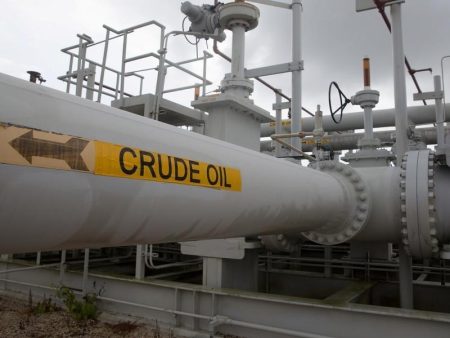(Reuters) – The United States and Britain launched strikes from the air and sea against Houthi military targets in Yemen in response to the movement’s attacks on ships in the Red Sea, an escalation of the Israel-Hamas war in Gaza.
Oil rose 2% on concerns about the potential impact a broader conflict in the Middle East could have on oil supplies from the region, especially those moving through the critical Strait of Hormuz.
Comments from investors and analysts:
CHRIS SCICLUNA, HEAD OF ECONOMIC RESEARCH, DAIWA CAPITAL MARKETS, LONDON
“This morning, the oil price has responded in a relatively measured way – is still below $80 a barrel – and the fixed income market is responding from the perspective that this might well not be so great for growth, but it is not a concern from an inflationary perspective, so there is a slight flight to quality, but not something that is a game-changer.”
SUSANNAH STREETER, HEAD OF MONEY AND MARKETS, HARGREAVES LANSDOWN, LONDON
“Oil prices have climbed sharply following the attacks, with Brent Crude now around 7% higher since early December, before Houthi rebels began targeting ships in the Red Sea. Reports coinciding with the UK/US military action suggest the British government is modelling scenarios which could see prices rise by $10 a barrel, if the Red Sea crisis continues, with gas prices at risk of going up by 25%.
“While its highly uncertain what trajectory energy prices will take, especially given the disruption to trade and the slowing global economy, risks of further price rises will be monitored closely by central bank policymakers. With major manufacturers and retailers warning of significant delays to products and components, the price of a vast range of goods threatens to march upwards again.”
JOSHUA CRABB, HEAD OF ASIA-PACIFIC EQUITIES AT ROBECO, HONG KONG
“Clearly this is one of the many geopolitical tail risks currently in the world. It is very hard to price in, given the bifurcated nature, uncertainty and assigning probabilities. As a result, a significant escalation is likely to have notable market impacts, but the probabilities are hopefully low.”
CHARU CHANANA, HEAD OF FX STRATEGY, SAXO, SINGAPORE
“Markets are on edge as risks of an escalation have risen. It will be particularly important to watch any further actions from either side especially going into the long weekend for the US, and particularly the threat of a wider regional conflict.
“With the near-term focus on geopolitical escalation risks, yen and gold could see safe-haven buying. Gold has been range-bound lately, but 50DMA at $2,015 is serving as a solid support.”
SAKTIANDI SUPAAT, REGIONAL HEAD OF FX RESEARCH & STRATEGY, MAYBANK, SINGAPORE
“The dollar (has) somewhat been supported on an intra-day basis. There is some reaction but it’s muted so far because the impact on oil prices doesn’t seem so significant as yet.
“I think markets are watching for the ramifications of these attacks and what will be the response from the Houthi rebels. A more sustained retaliation, not just from the Yemenis or Houthis, but from other extreme groups in the region might lead to further risk aversion.”
KHOON GOH, HEAD OF ASIA RESEARCH, ANZ, SINGAPORE
“I think at this stage, it’s difficult to predict. Whilst the attacks have already seen disruptions and diversions of shipping and that has already caused quite a sharp jump in shipping freight rates just in the last few weeks, if this strike is able to…resolve the issue and shipping lanes can be secured again and things normalise, then that’ll be positive as we’ll see a normalisation of freight rates.
“I think the concern is that if this starts to escalate… which will cause a potential spike up in oil price in particular, and further disruptions in shipping lanes.
“Markets are taking a wait-and-see approach for the time being, hence we’re not seeing too much of a reaction. If we see a massive escalation of the situation…then the traditional flight-to-safety will see U.S. Treasuries, safe-haven currencies like yen and Swiss franc benefit.”
SHANE OLIVER, CHIEF ECONOMIST, AMP (OTC:), SYDNEY
“The U.S. and UK launching air strikes on Houthis in Yemen is adding to the risk of Iran being directly drawn into the conflict which would threaten oil supplies.
“The creeping widening in the Israel/Hamas conflict poses a risk to global growth and inflation, for example Houthi attacks on Red Sea shipping adding to transport costs as ships have to go around Africa.
“A weaker patch is often evident into February or March after seasonal strength from October. While we expect shares to provide reasonable returns this year, they are likely to be more constrained and vulnerable than last year and worries about delays in rate cuts, recession and geopolitics could drive a deeper first half pullback than seen last year.”
ROB CARNELL, ASIA-PACIFIC HEAD OF RESEARCH, ING, SINGAPORE
“When we got in this morning after what was fairly disappointing U.S. inflation data, you’d have expected bond yields to spike higher on that. In fact, they did the opposite. That’s probably a reaction to what’s been happening in the Middle East with the U.S., UK air strikes on the Houthis. There will be a shift back towards risk aversion. This hasn’t fully blossomed out into a proper risk-off mode.
“I think people are looking for a little bit of safety at the moment. Possibly, also, coming ahead of this weekend’s Taiwan election, most people are just thinking ‘maybe I want to take a little bit of risk off the table’, and that’s maybe a factor as well. So I think the bond market’s probably the clearest indication of where things are going.”
(This story has been refiled to fix the spelling to Strait of Hormuz, not Straits, in paragraph 2)
Read the full article here







